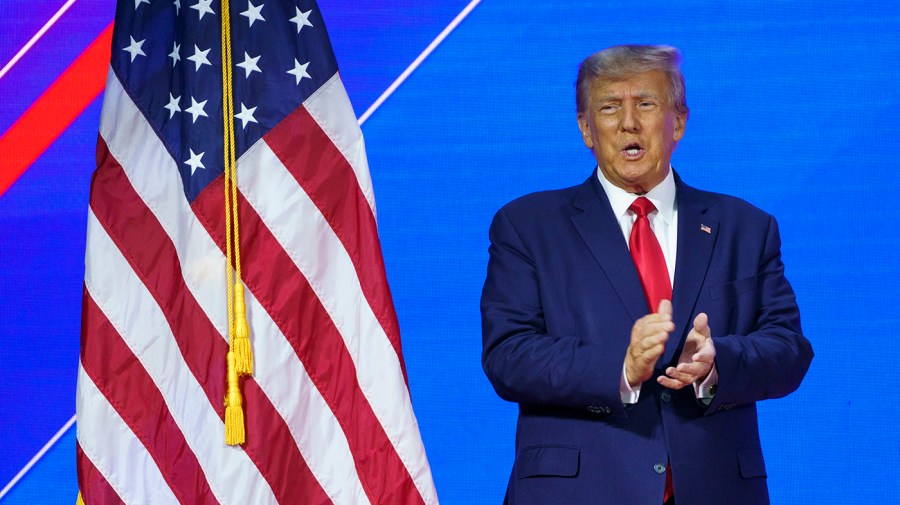
Former President Trump has escaped numerous controversies that would doom other candidates — but he is not entirely immune to the laws of political gravity.
A new poll suggests the point could be proven in dramatic fashion if any of the four criminal trials he is facing results in a conviction.
The poll, released Wednesday from Bloomberg and Morning Consult, found that 53 percent of voters in key swing states would refuse to vote for Trump if he were convicted of a criminal offense. A slightly higher share, 55 percent, say they would reach that conclusion if he were sentenced to prison.
If those figures are accurate, they could easily decide the election, given how close Trump’s two elections so far, in 2016 and 2020, have been.
A conviction “is absolutely a potential dealbreaker in an election that either [Trump or President Biden] could win or lose for a whole variety of reasons,” said GOP strategist Doug Heye, a former communications director for the Republican National Committee.
The Bloomberg poll was conducted in seven states that will likely determine the outcome of the election: Arizona, Georgia, Michigan, Nevada, North Carolina, Pennsylvania and Wisconsin.
Interestingly, the poll suggested 20 percent of voters from those states who had voted for Trump in 2020 would be either “somewhat unwilling” or “very unwilling” to vote for him again if he were convicted.
“The preponderance of polling out there shows that there is a chunk of Republican voters who say a felony conviction would be a bridge too far,” said GOP strategist Dan Judy. “Does that mean that Donald Trump still gets 80 to 85 percent of Republican voters, rather than 90 or 95 percent? Probably. But that could easily be the election right there.”
Of course, there is a big question mark over whether the polling figures would really be borne out in a general election. And for the moment, absent any criminal convictions, the Bloomberg poll has Trump up by six points with registered voters across the battleground states.
Some dissatisfied voters typically hold their noses and vote for the candidate who comes closest to aligning with their views, even if they have serious misgivings.
In 2016, numerous people — including several members of Trump’s inner circle — believed his chances of victory had been vaporized with the release of the so-called Access Hollywood tape, in which the candidate was heard speaking extremely crudely about women.
Over the course of last year, four indictments were leveled against Trump, totaling 91 criminal charges. But rather than hurt him, those developments seemed to tighten his hold on the Republican nomination.
Republican voters, rather than fleeing, rallied around him, seemingly sharing his view that he was being unfairly targeted.
Now, Trump has won the first two contests in this year’s primary process by easy margins.
But there is a vast difference between the GOP electorate and the public at large. A new Economist/YouGov poll released Wednesday found Trump to be viewed favorably by 79 percent of Republicans but by just 40 percent of the general public.
In addition, Trump will now face months of attacks from the Biden campaign and his allies. The general contours of that assault are already clear, with Trump’s foes arguing that his election would put democracy itself at risk.
Trump asserts his innocence of all the charges against him. Meanwhile, his lawyers have repeatedly pressed for delays.
As it stands, Trump’s trial on charges in New York relating to alleged hush money payments is set to start on March 25. His trial relating to the sensitive documents discovered at Mar-a-Lago is scheduled to begin on May 20. And prosecutors in Georgia are proposing that his trial on charges of conspiring to overturn the election begin on Aug. 5.
If Trump indeed wins the GOP primary cycle, he will officially be crowned as the party’s nominee at the Republican National Convention in mid-July.
His federal trial on charges relating to attempts to overthrow the 2020 election — including the events of Jan. 6, 2021 — could also take place this year. But that matter is up in the air while courts decide Trump’s claim that a president should be immune from prosecution.
Beyond the fundamental question of whether Trump is found guilty on any charge — and whether he could get an electoral boost if he were acquitted — there is also a more practical issue.
Trump, now almost certainly to be the GOP nominee, will have to divide his time between trying to get back into the White House and trying to stay out of prison.
“As people always say, the most valuable resource you have as a candidate is time,” Judy said. “The more time he is spending, and his people are spending, trying to keep him out of court and out of prison, the less he is spending out on the campaign trail trying to fire up his base, or persuade the few persuadable voters in this country.”
Yet even Judy, a Trump skeptic, acknowledged that predicting the former president’s fate has long proved a fool’s errand.
“As with so many things with him over the years, there is no history to fall back on here,” he said. “There is nowhere to go to say, ‘This is what has happened in the past in a similar situation.’ There is no way to know for sure.”
The Memo is a reported column by Niall Stanage.














